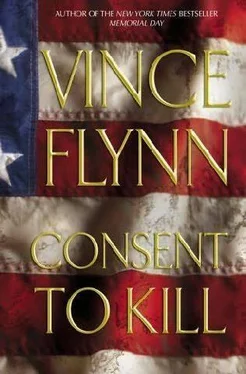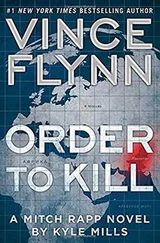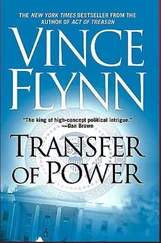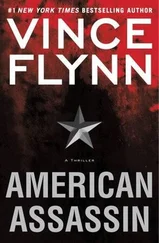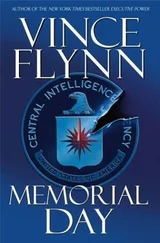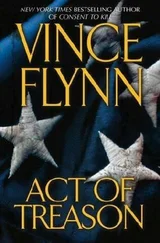Failure was unacceptable. The thought of them getting away with it, the knowledge that the longer he stayed cooped up in this room, the more likely it was that the killers would simply disappear, was what stopped his descent into darkness and depression. Ultimately, though, it was the thought of how pathetic he must look, curled up in a ball sobbing, that forced him to throw back the blankets, ignore the aches and pains, and swing his feet onto the floor.
As soon as he was upright a stabbing pain hit him in the temple and he realized it was the sedatives. It was time to take a complete physical inventory. He was wearing a pair of pajama shorts. He briefly wondered where they'd come from and then it occurred to him that he no longer had any clothes. The house, the car, all of his possessions, they were gone. He assumed even Shirley, his dog, had gone up in the explosion. Compared to the loss of Anna it was all trivial. He looked down at his leg and examined the deep purple bruise on his right thigh and then the small surgical marks on his left knee. The thigh looked far worse than the knee. His broken right arm felt fine, but his ribs were tender. He pushed himself off the bed and stood. The first step was more of a shuffle. His left knee was stronger than he would have thought. There was a robe on the back of the door and he hobbled over and grabbed it.
He made his way downstairs slowly, and in the process realized that his right leg was definitely in worse shape than his left. He paused near the front door and looked out the side window. The sky was gray and there wasn't a person in sight. There was a mirror on the wall and he stopped to look at his reflection. His thick black hair was unkempt, and his face was covered with stubble. The entire house felt unusually quiet. Rapp, so used to being alone, suddenly felt the need to be around people. He wanted information. He wanted to know what was going on. He shuffled his way down the hall to the kitchen. His legs were beginning to work better. The smell of coffee caught his attention. The clock on the microwave told him it was 9:53 in the morning. He found a mug in the cupboard and poured himself a cup.
Out of the corner of his eye, Rapp caught some movement. He shuffled over to the sink and looked out the window. Two people were sitting at a table on the patio. It was Irene Kennedy and her eight-year-old boy, Tommy. Tommy was slouched in his chair looking bored, kicking his leg up and down. Irene was talking on her phone. Rapp took in a deep breath and slowly let it out. Tommy was like a nephew to him. The boy adored Anna. Rapp suddenly felt both foolish and selfish for thinking only of himself. Anna would be missed by a lot of people.
Rapp set his coffee down and made his way over to the door. He twisted the handle and pulled. The door didn't budge. Rapp remembered he was in a secure CIA facility. Just like his house, the door jambs were reinforced and reversed so they only opened out. He pushed the door open and stepped carefully onto the brick patio. He pulled at the knot on his robe and slowly made his way over to them. Tommy noticed him and stopped fidgeting. He sat up straight and appeared hesitant. Kennedy turned around and told whoever she was talking to that she had to go. Rapp noticed movement on both his right and left and turned in each direction. Two of Kennedy's bodyguards were standing post. Rapp made it to the table and little Tommy stood. His eyes were already welling with tears. Rapp opened his arms and the boy buried his face in Rapp's stomach.
Tommy began sobbing uncontrollably. In between quick gasps of air he choked out the words "I'm sorry."
Rapp fell into a chair and held him as tightly as his ribs could take. The sight of someone he cared so much for, someone he knew adored his wife, melted what little resolve he'd managed to muster and the tears flowed once more.
They sat underneath the umbrella like that for a long time. He tried to tell Tommy everything would be all right, but even he could hear the uncertainty in his voice. Everything wasn't going to be all right. The one person he loved more than anything in the world was gone, and he found himself teetering on the verge of complete despair. How did his life get to this awful place?
Rapp heard a dog bark and he looked up to see Shirley, his collie mutt, running toward him. The unexpected surprise put a smile on his face. Rapp let go of Tommy and held out his arms for Shirley. The dog jumped up, placing its paws on Rapp's lap. Rapp scratched her neck and said, "I thought you were gone."
"One of your neighbors took her in after the explosion," Kennedy said. "Tommy thought it would be a good idea to bring her with." Kennedy smiled at her son. "He said a person came to school this year and told them dogs helped people recuperate after they've been in an accident."
Rapp scratched Shirley's neck some more and looked at Tommy. "Thanks, buddy."
"You're welcome." Tommy reached out and petted the dog. "If you need me to, I can take care of her."
"That'd be nice."
"I also brought my Game Cube."
Rapp nodded, touched that the little boy was so concerned.
"Maybe we could play later." He started kicking his leg. "I thought it might help."
Rapp wanted to cry all over again, but managed to keep it together. "Thanks, Tommy."
Kennedy wiped away a tear of her own and asked Rapp, "Are you hungry?"
"Starved."
The three of them went back into the house and Kennedy made pancakes. She managed to keep the conversation off the explosion by handing Rapp a newspaper and sending Tommy into the other room to set up his Game Cube. As he read the paper, Kennedy informed him that his brother Steven had called. He was on his way down from New York. Kennedy offered to bring him to the house for dinner. Rapp simply nodded. Both Rapp's mother and father were gone. He and his brother were not close in the sense that they spent a lot of time together, but they shared a deep bond. It would be good to see him.
The hard part came when she brought up Anna's parents. They'd arrived the day after the explosion and were waiting to talk to him. Funeral arrangements needed to be made, and they wanted his input. It was obvious Rapp was dreading the confrontation. They would blame him for their daughter's death. Why wouldn't they? He blamed himself, after all.
They ate breakfast outside next to the pool. Rapp devoured four pancakes and three sausage links. Tommy tried to keep up with him, but only managed two of each. They were just finishing when Scott Coleman showed up. He entered the backyard through a side gate. He was wearing jeans, hiking boots, a blue T-shirt, and a baseball cap. A large black nylon bag was slung over his shoulder. He stopped next to Rapp and dropped the bag.
"I picked up a few things at some stores. I assume you're still wearing extra small."
Rapp ignored the barb and slowly leaned over to unzip the bag. His ribs were giving him some difficulty. There were several North Face T-shirts, a fleece vest and jacket, sunglasses, hiking boots, pants, underwear, socks. The colors ran decidedly toward muted greens and light browns. At the bottom of the bag he found a brand-new Glock 17 pistol complete with silencer and hollow-point ammunition.
Coleman rubbed Tommy's short hair and asked, "How are you doing?"
"Fine."
"Do you think I could have a minute alone with your mom and Mitch?"
Tommy looked at his mother and then said, "Sure." He stood. "I'm gonna go look at the horses."
"Be careful," Kennedy said as Tommy took off at a trot. The boy called for Shirley to follow and she sprang after him.
When he was far enough away Rapp pulled the pistol from the bag and held it up to the sunlight for a better inspection. He grabbed the back of the slide between the meaty part of his palm and his fingers and yanked it back. He moved the weapon around and checked out the chamber and barrel. The piece was well oiled and clean.
Читать дальше
